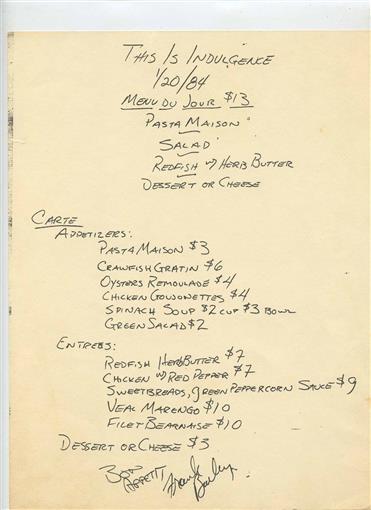Indulgence Bistro Menu New Orleans Louisiana 1984 Frank Bailey

A single page menu from Indulgence Bistro with 2 locations in New Orleans Louisiana. Dated 1984. The Bistro of Frank Bailey. Measures about 8 1/2" x 11" and the back is blank.
From Extinct Restaurants ,**** Indulgence, Warehouse District: 1539 Religious Street Garden District: 2727 Prytania Street 1981-1986 Frank Bailey was a different sort of restaurateur. He came to New Orleans from Texas, where he worked as a food writer and caterer, after spending enough time in France to know his way around a dining room. He is the brother of Texas politician Kay Bailey Hutchison, with whom he has worked off and on since leaving town. Between further extended stints in France. Not long after he fetched up in New Orleans, he began writing a food column for the Dixie Roto magazine in the Times-Picayune, and later for the newspaper’s food section. While doing that, he started a catering operation in a unique building on the edge of a large, desolate railroad yard, on the corner of Religious and Orange Streets. The structure—built by the Jesuits in the late 1700s—was old even by New Orleans standards, and looked it, with extra-thick walls and small windows. (The building is now occupied by Le Citron Bistro.)
Bailey built a dining room in there and began serving lunch. Indulgence (on Religious Street) became a word-of-mouth phenomenon, requiring reservations days in advance. It soon surpassed the catering business, opening a few nights for dinner. In that neighborhood, however, armed guards were a necessity. A better location turned up. A little French place called the Garden Café gave up the ghost in The Rink, a new boutique mall on Prytania Street at Washington Avenue. Bailey and his partner Liz Page moved Indulgence’s a la carte dining room there in 1982. The timing was perfect: the Uptown gourmet bistros were just beginning to appear across Uptown, and each new venue brought more attention to all of them. Indulgence was always different from the other bistros, however. It was more French than anything else, and not very Creole. Still, French and Creole dish names have enough similarity that nobody was scared off. And when they realized what they ere being served was different from what they were used to, the goodness of the food was enough to leave a favorable impression. So you got goujonettes (fingers to you and me) of chicken or fish. Not shrimp remoulade, but fried oysters remoulade, with celery root—because celery root was what was most often paired with remoulade in France. Frank liked organ meats; sweetbreads, liver, and even kidneys turned up frequently. No matter what, the food here was quite different from anything else hereabouts in those days. It was the Lilette of its time. The menu was not entirely beholden to French food. Fritto misto (Italian for a plate of fried this and that) was a common appetizer. There was a Basque salad. They made great omelettes at lunch, filled with the likes of feta cheese, fresh basil, and fresh tomatoes. Lightness was a hallmark of the entire menu. Frank had strong feelings about what was good, and this led Indulgence into some quirks. Instead of serving the standard New Orleans French bread, they had a big loaf of rustic French French bread on a sideboard, and cut off a hunk for each new table. There were no peppermills (which had just caught on big in New Orleans restaurants), but Frank ground a pile of peppercorns every day and served the coarse result out of little jars with littler spoons. There were no envelopes of artificial sweetener. “I hate the whap whap whap sound it makes when people open them,” he said. Ultimately, Indulgence was a little too cool for New Orleans. And Bailey cooled on New Orleans. After five or six years he shut all the Indulgences down and made himself scarce—although he kept writing his newspaper column for a long time. He and I and Dick Brennan Sr. had lunch together once a month for a few years. I learned quite a few things from Frank. He was the best combination food writer-restaurateur in the annals of the New Orleans food scene. One of the only ones, really. in fine condition
Our Policies:
For Multiple Purchases A single payment for all items would be appreciated.
We Ship World Wide Due to the Impact of USPS Policy Changes, Delivery time of some International Packages may be 8 to 18 weeks or more
International Buyers – Please Note:
Import duties, taxes, and charges are not included in the item price or shipping cost. These charges are the buyer's responsibility.
Please check with your country's customs office to determine what these additional costs will be prior to bidding or buying.
STATE Sales Tax Based on Applicable Tax Laws, will calculate and, collect Sales Tax for items shipped to customers in States requiring Sales Tax collection.
You may be interested in our other listings.
